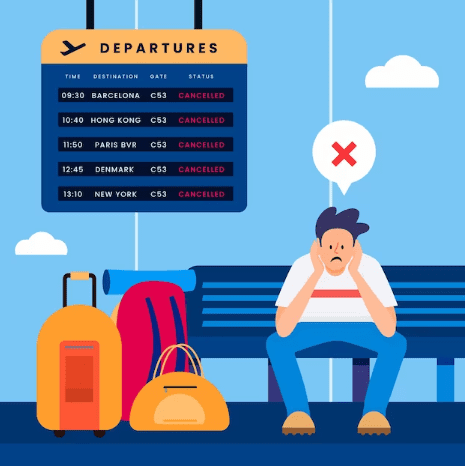
Flight Cancelled? Need to Know for Trip Cancellation
Travelling is an exciting experience, but unexpected circumstances can sometimes disrupt our plans. That’s where travel insurance comes in. Travel insurance is an insurance policy designed to protect your financial investment by covering various risks, including trip cancellation or interruption, lost baggage, medical expenses, and more.
Review Limits & Exclusions on Trip Cancellation
Before purchasing travel insurance, reviewing and understanding the limits and exclusions of the trip cancellation coverage is crucial. Familiarize yourself with the covered perils that need to trigger a claim under the trip cancellation coverage. These may include unexpected illness, travel advisories, cancelled flights, job loss, or pregnancy.
Additionally, pay attention to the maximum coverage limits that the insurer may pay in the event of a claim in terms of each listed coverage. When you purchase an insurance policy, ask your advisor for a copy of the wording booklet, either physically or digitally. It’s good to keep on hand in case you’re unsure of anything later on. Lastly, and the most often missed part, is to review the exclusion list in the policy wording to ensure you have a basic understanding of what is covered and what is not. Often, exclusions are described in legal jargon, so don’t hesitate to seek clarification from your advisor to avoid any confusion.
Pro Tip: If your doctor advises against traveling before you book your trip or purchase insurance, trip cancellation coverage cannot be used to refund your trip expenses. Remember, if the doctor says NO, then don’t GO.
Reward Points and Non-Refundable Travel Costs
Many travellers use reward points to save money on their trips. However, it’s important to note that travel insurance cannot reimburse any travel arrangements, such as flights or accommodations, that were paid for with reward points. While policies may cover fees for reinstating points, the actual cash value of the points is not covered.
On the other hand, non-refundable travel costs are eligible for reimbursement under trip cancellation insurance. These are pre-paid travel arrangements, such as airline costs, accommodations, or rental cars, for which you did not receive a refund. Let’s explore some examples to better understand this concept:
Example 1: Suppose you booked a flight, but the airline cancels it and provides you with a refund for the purchased tickets.
In this case, your insurer cannot reimburse you because the airline ticket was not a ‘non-refundable’ item since you already received your money back.
Example 2: Now, let’s say you pre-arranged shuttle transportation and pre-paid for the service. However, due to a flight cancellation, the shuttle company does not refund the amount you paid.
In this scenario, you can submit the receipt to your insurer under trip cancellation coverage to be reimbursed for the pre-paid cost.

Documentation & Receipts
In the event that you need to file a claim, proper documentation and receipts are crucial. Regardless of whether it’s a trip cancellation or trip interruption claim, you must provide proof of purchase to be eligible for reimbursement. To expedite the claims process, consider including memos outlining the reasons for certain expenses.
For instance, if you had to book an additional night at a hotel due to a flight cancellation, include this information in your proof of loss. By providing a timeline of events, associated expenses, and additional context, you can help the insurer understand the situation better and avoid unnecessary back-and-forth for further information.
Fun Fact: Don’t forget to include records of any refunds you received from travel agents, airlines, hotels, or tour companies. When submitting your claim, provide a record of what was refunded and what wasn’t. This will help ensure that any eligible expenses not covered by the refund are considered under your policy coverage.
Real-Life Example of Trip Cancellation Travel Insurance
To illustrate the practical use of trip cancellation insurance, let’s consider a real-life example. Meet Sarah, an avid traveller who had meticulously planned a dream vacation to Europe. Unfortunately, a sudden illness prevented her from embarking on the trip, and her doctor advised that travelling at this time would not be a good idea.
Fortunately, Sarah had purchased travel insurance with trip cancellation coverage. She immediately contacted her insurance provider and explained the situation, providing the necessary documentation, including her doctor’s recommendation against travelling. As a result, Sarah was able to recoup the non-refundable travel costs, such as flights and accommodations, through her trip cancellation insurance.
This example highlights the importance of being prepared and having the right coverage in place to safeguard your travel investment.
Before embarking on your next trip, it’s crucial to discuss trip cancellation coverage with your insurance advisor. They can guide you through the intricacies of the policy, answer any questions you may have, and ensure you have the appropriate coverage to protect your travel investment.
Understanding trip cancellation insurance is essential for any traveller. By reviewing the limits and exclusions, being aware of the restrictions on reward points and non-refundable travel costs, and maintaining proper documentation, you can navigate the claims process with confidence.

Thanks for reading our article; I hope you enjoyed this month’s topic on trip cancellation insurance for travellers. Here are some more ways to access more insurance information and tips:
- Visit our Blog/article page each month, where we publish various insurance articles and share information on specific industry products:
→ Learn more or get a quote for Travel Insurance and visit our PRODUCT PAGE
2. Follow us on LinkedIn to stay up to date on the latest business insurance articles and follow our company updates:
Posted in Travel on January 24, 2023 by Hope Prost





